Identities of teachers from English speaking countries through discourses on teaching standard English in Vietnam
The doctrine of English appropriateness has had a great impact on how to teach
English language all over the world. However, in this global era, the intercultural
interactions among non-native English users outnumber the contacts with the native ones,
which greatly challenges the popular discourses of standard English. Interestingly, through
analyzing the discourses in the facebook group of teachers from English speaking countries
as well as the discourses on teaching standard English for Vietnamese learners on the
media, the author has found out that there exists great discrimination among native and
non-native teachers in Vietnam, which has already been confirmed in many recent
researches in the field of discourses and identities. Significantly, this study also shows that
there is a strong internal conflict among native English speaking teachers, about the choice
of teaching standard English in Vietnam, through which their identities are constructed - the
key factor in international language teaching and educational collaborating.
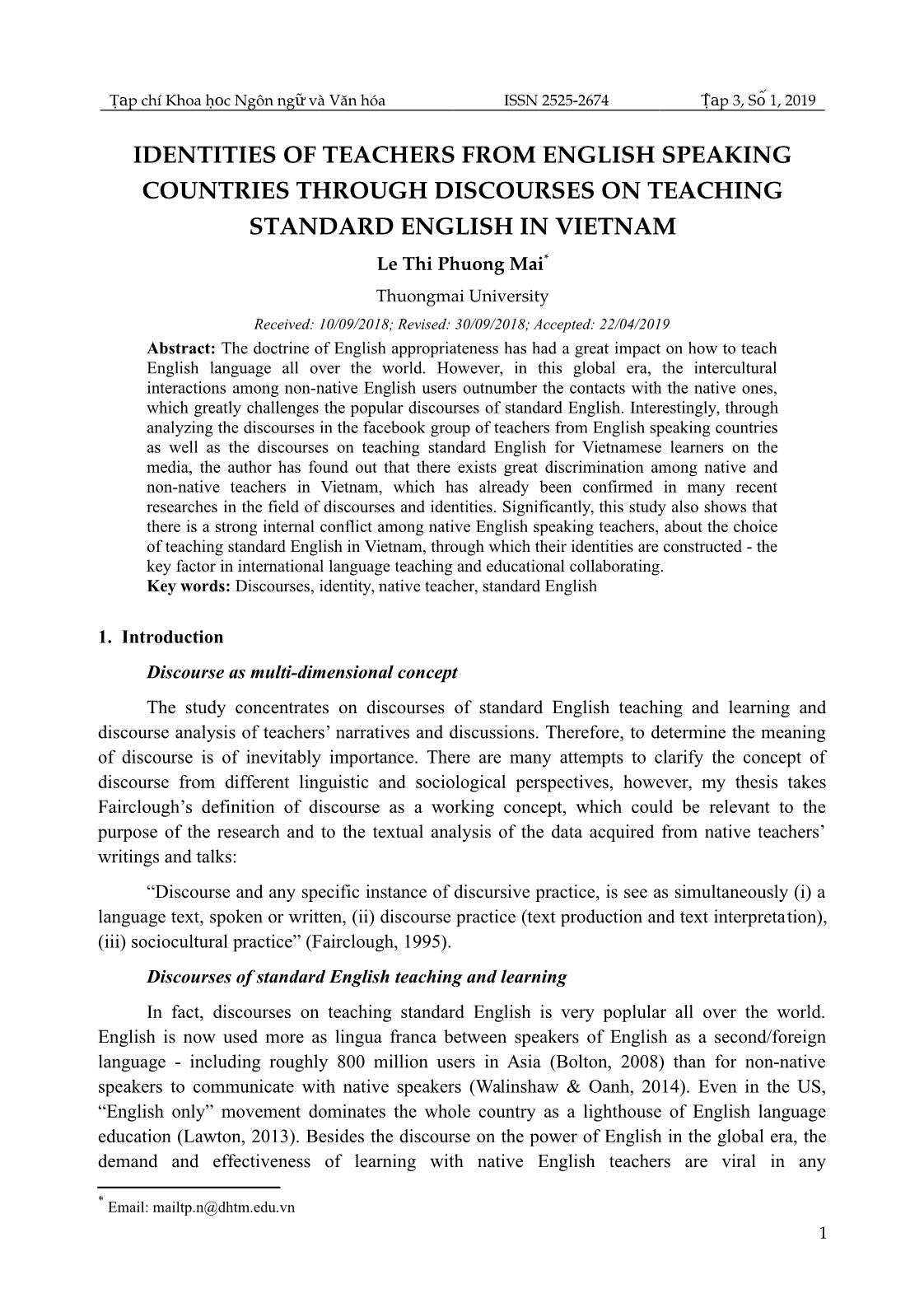
Trang 1
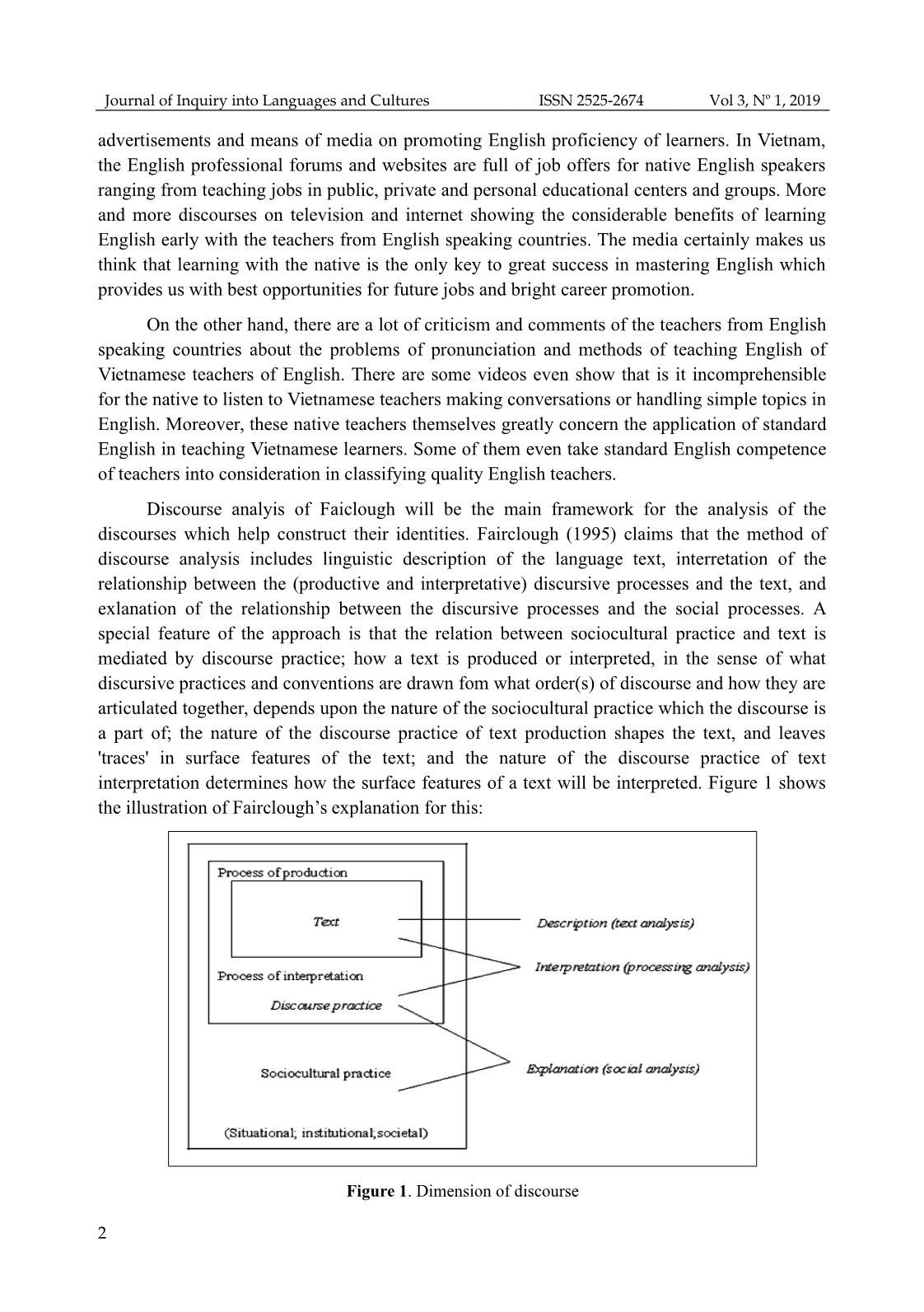
Trang 2
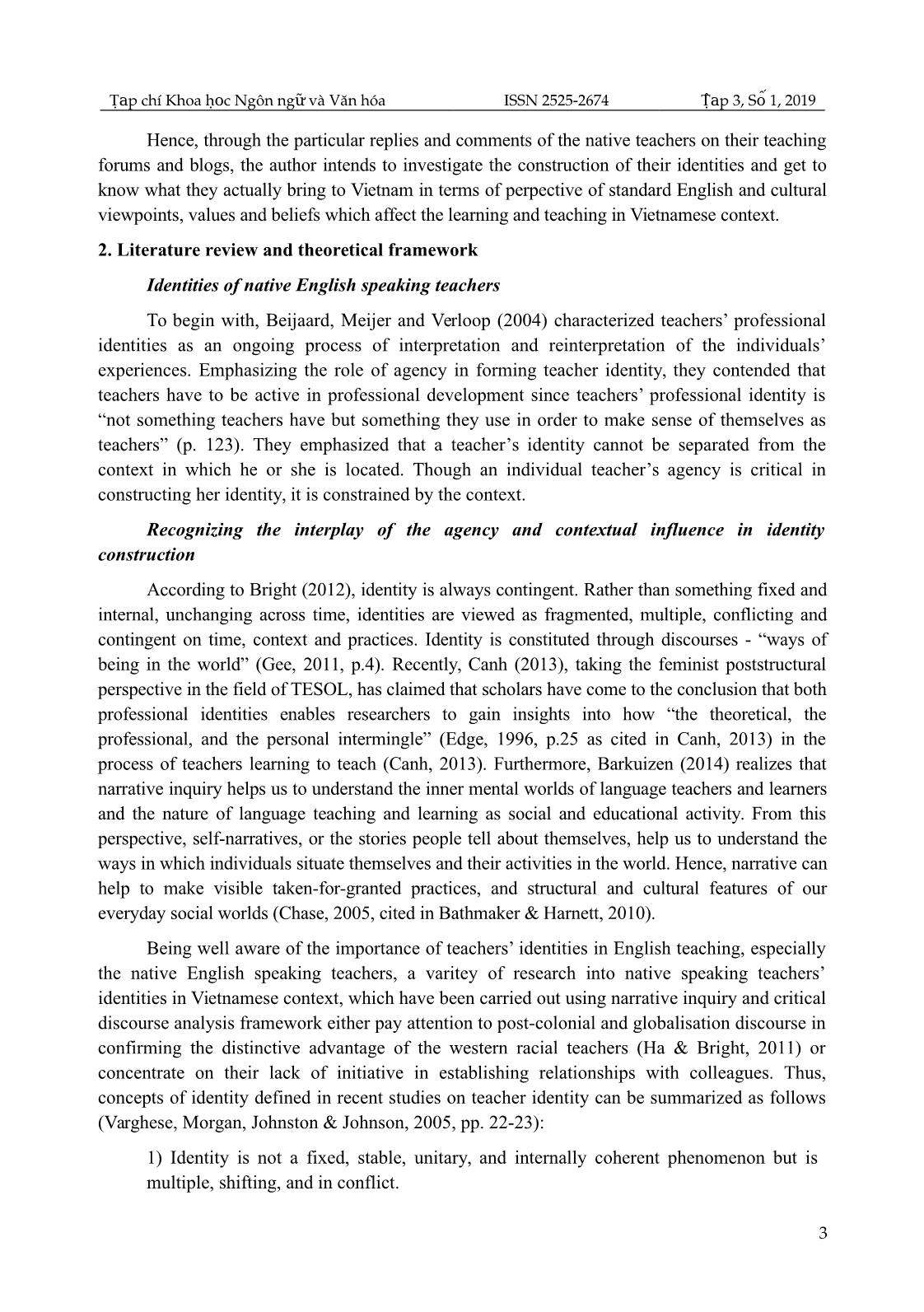
Trang 3
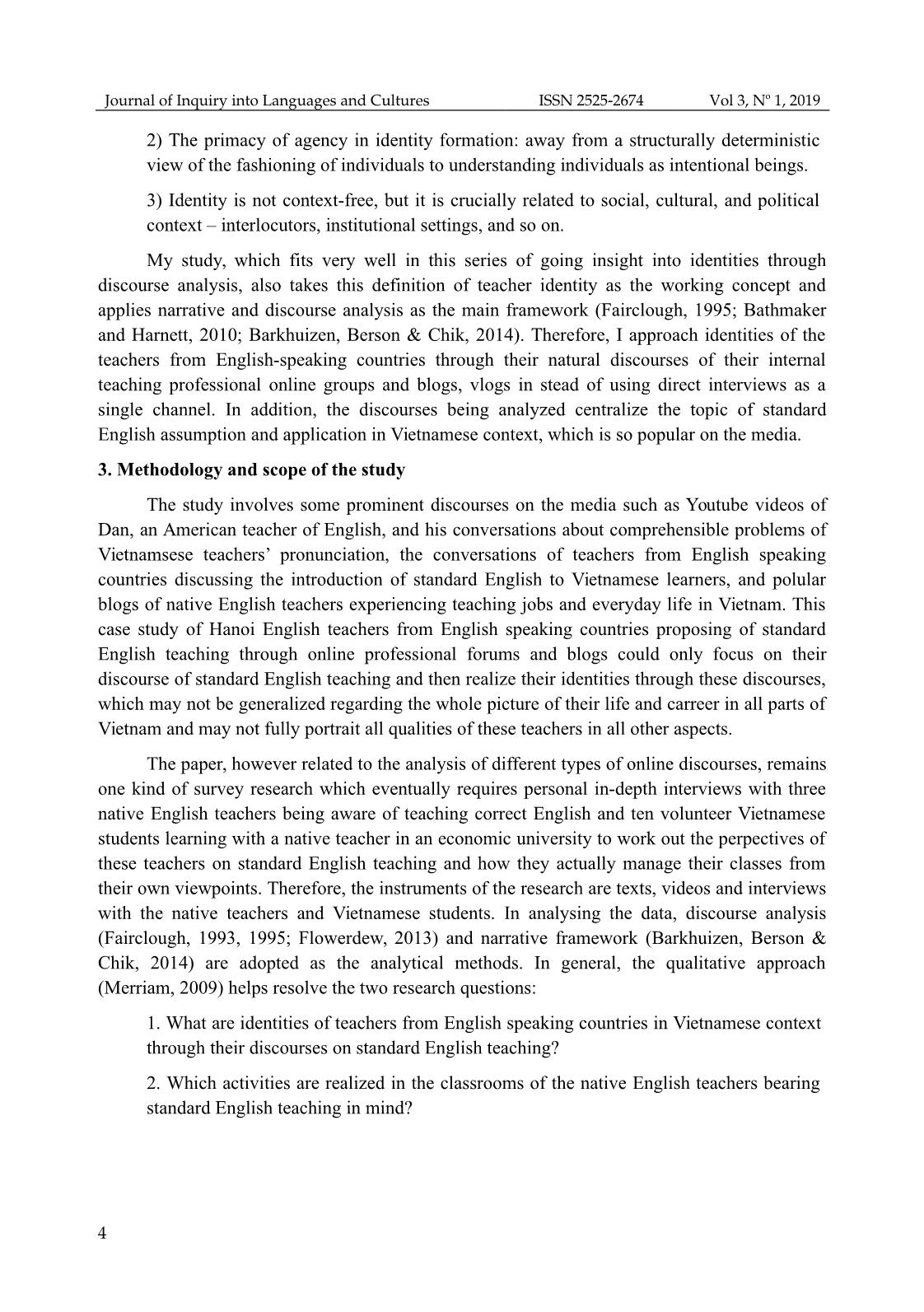
Trang 4
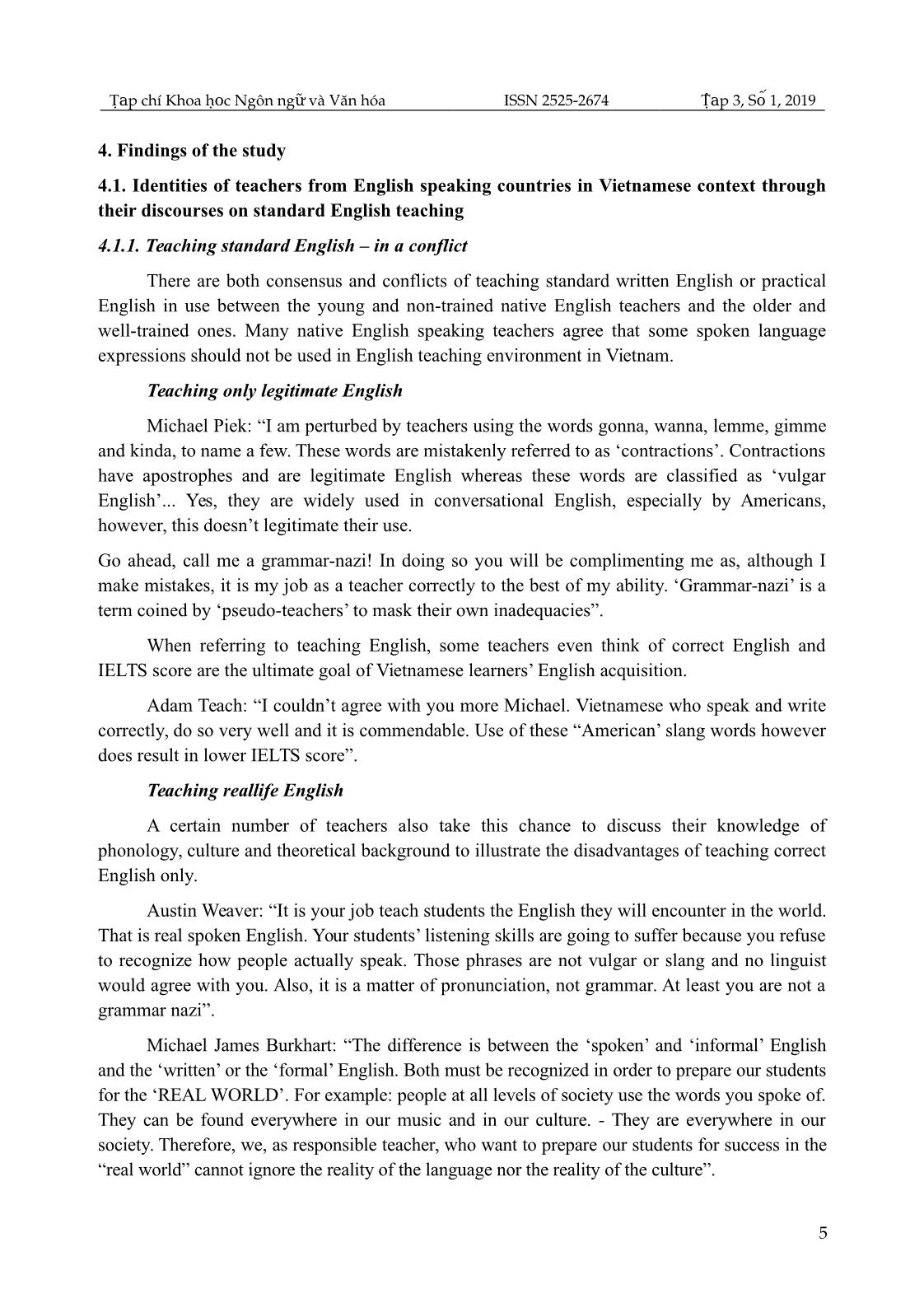
Trang 5
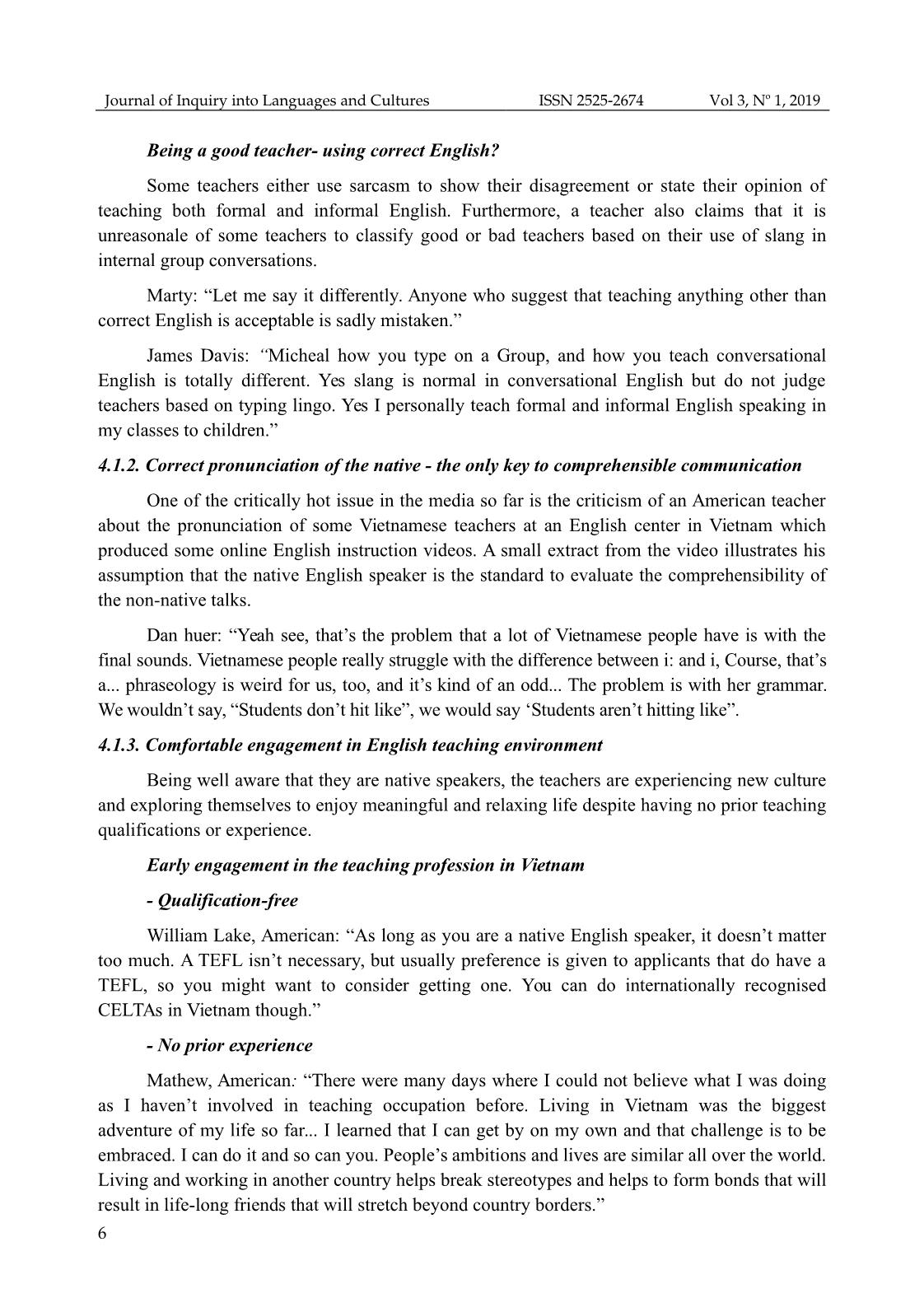
Trang 6
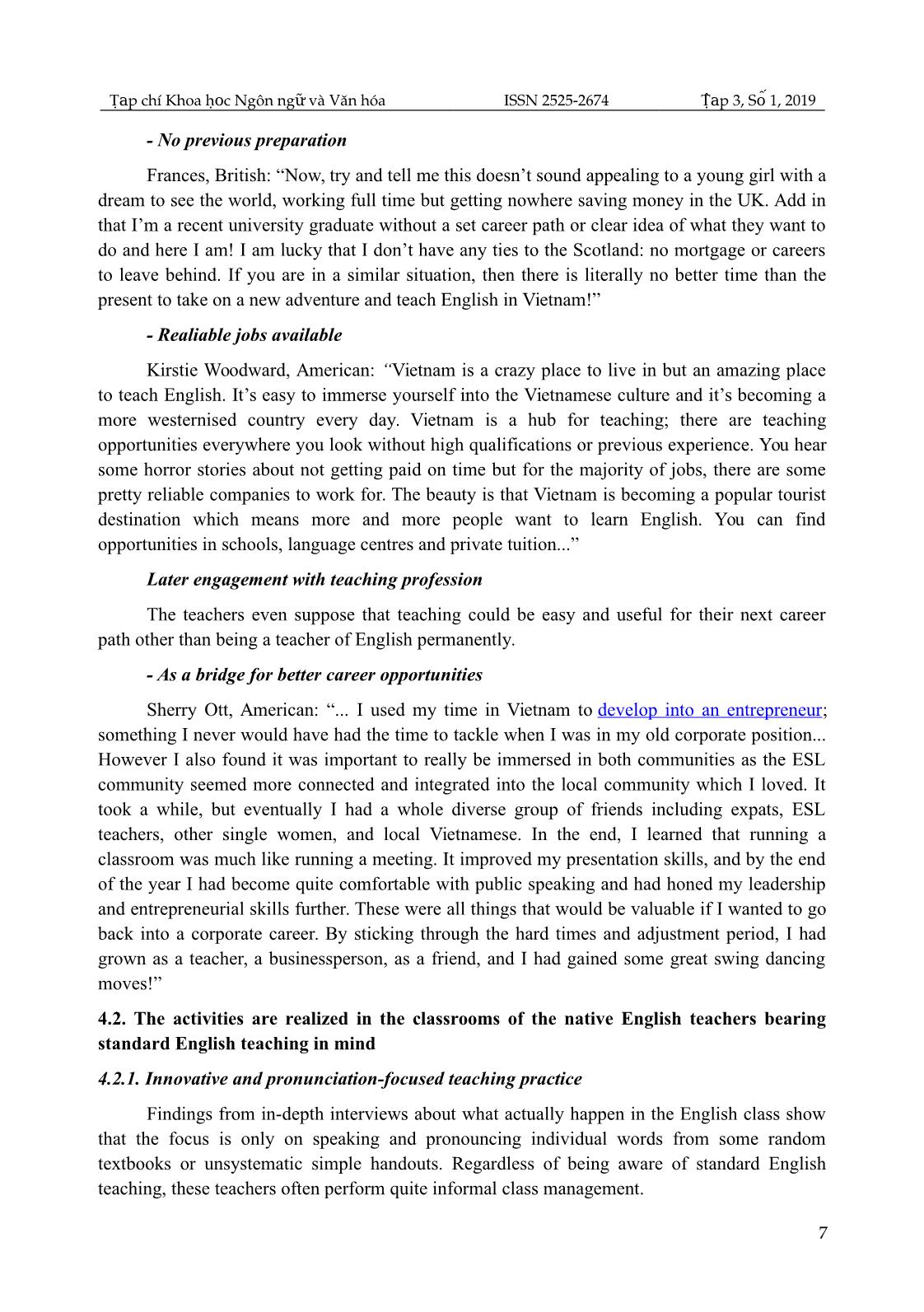
Trang 7
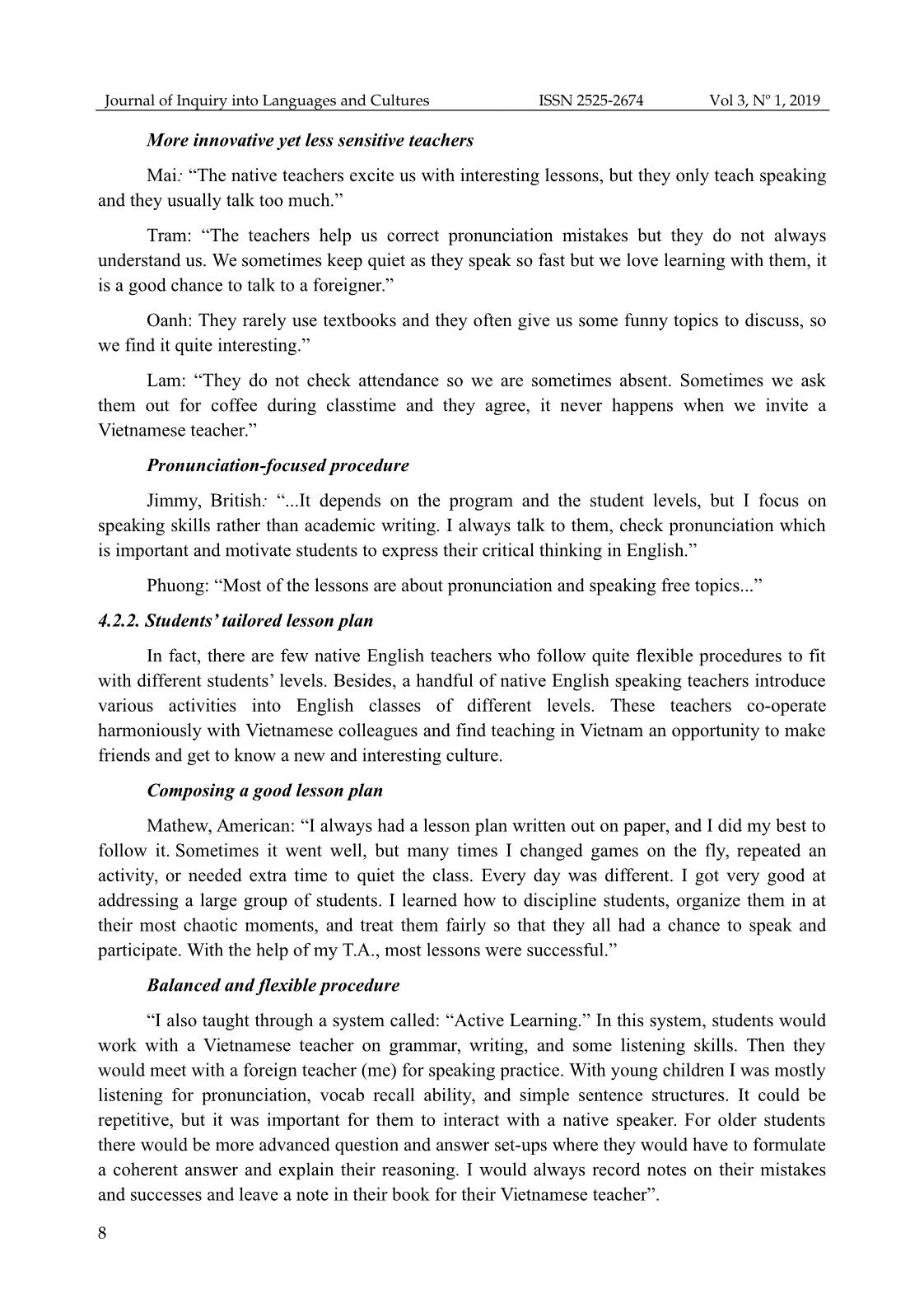
Trang 8
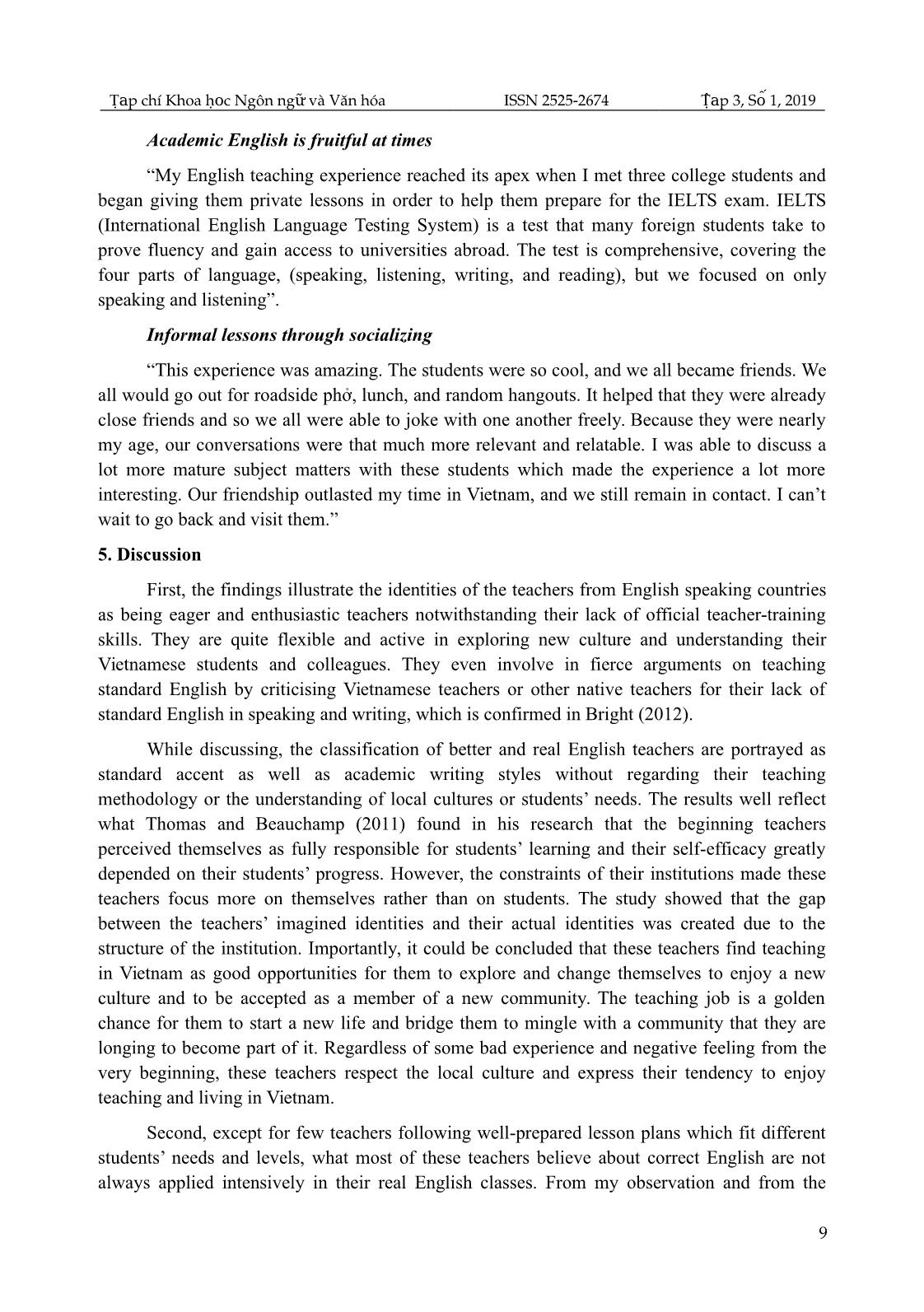
Trang 9
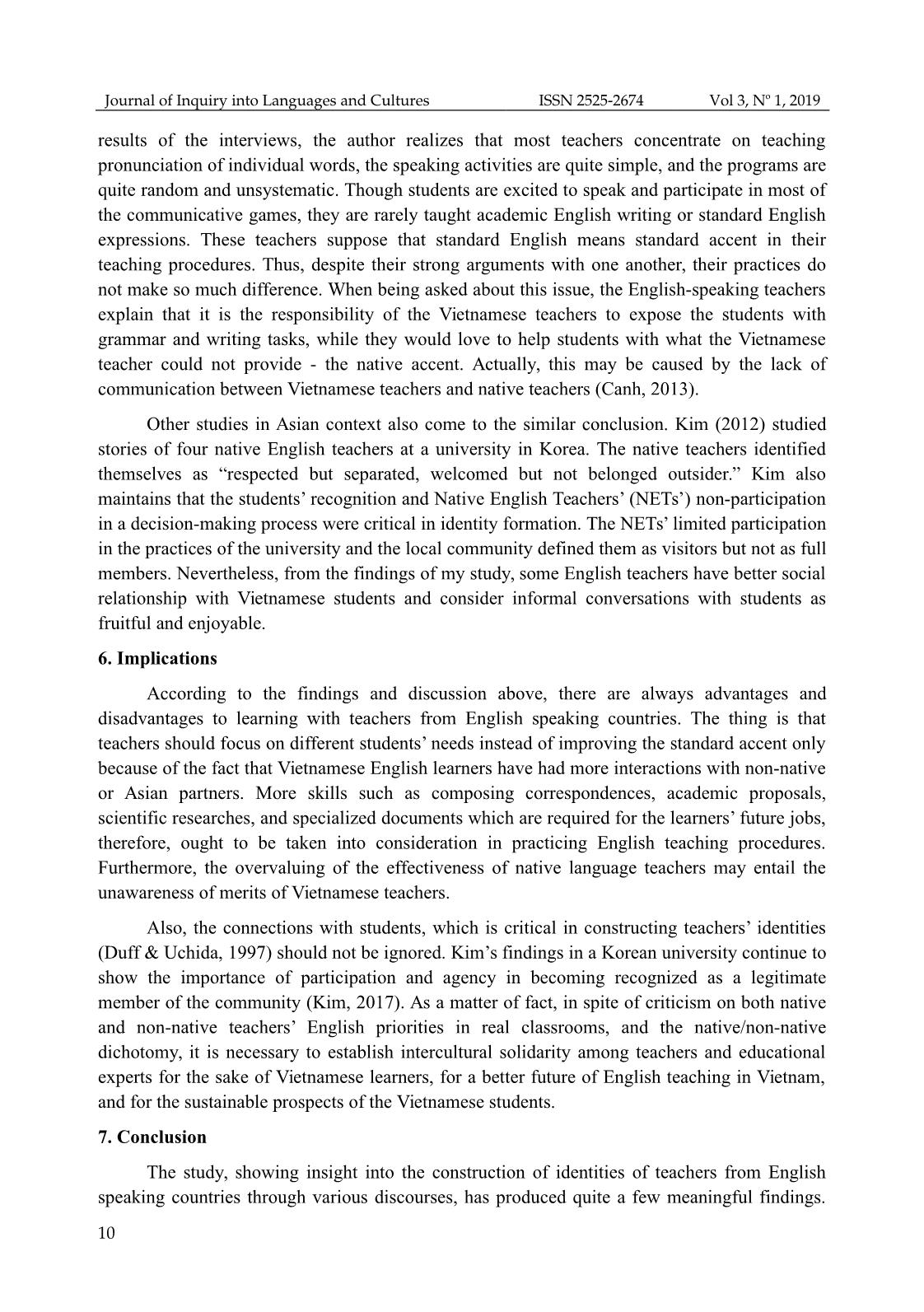
Trang 10
Tải về để xem bản đầy đủ
Tóm tắt nội dung tài liệu: Identities of teachers from English speaking countries through discourses on teaching standard English in Vietnam
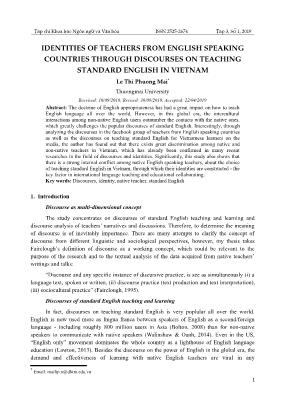
m: “They do not check attendance so we are sometimes absent. Sometimes we ask them out for coffee during classtime and they agree, it never happens when we invite a Vietnamese teacher.” Pronunciation-focused procedure Jimmy, British: “...It depends on the program and the student levels, but I focus on speaking skills rather than academic writing. I always talk to them, check pronunciation which is important and motivate students to express their critical thinking in English.” Phuong: “Most of the lessons are about pronunciation and speaking free topics...” 4.2.2. Students’ tailored lesson plan In fact, there are few native English teachers who follow quite flexible procedures to fit with different students’ levels. Besides, a handful of native English speaking teachers introduce various activities into English classes of different levels. These teachers co-operate harmoniously with Vietnamese colleagues and find teaching in Vietnam an opportunity to make friends and get to know a new and interesting culture. Composing a good lesson plan Mathew, American: “I always had a lesson plan written out on paper, and I did my best to follow it. Sometimes it went well, but many times I changed games on the fly, repeated an activity, or needed extra time to quiet the class. Every day was different. I got very good at addressing a large group of students. I learned how to discipline students, organize them in at their most chaotic moments, and treat them fairly so that they all had a chance to speak and participate. With the help of my T.A., most lessons were successful.” Balanced and flexible procedure “I also taught through a system called: “Active Learning.” In this system, students would work with a Vietnamese teacher on grammar, writing, and some listening skills. Then they would meet with a foreign teacher (me) for speaking practice. With young children I was mostly listening for pronunciation, vocab recall ability, and simple sentence structures. It could be repetitive, but it was important for them to interact with a native speaker. For older students there would be more advanced question and answer set-ups where they would have to formulate a coherent answer and explain their reasoning. I would always record notes on their mistakes and successes and leave a note in their book for their Vietnamese teacher”. 8 T p chí Khoa h c Ngôn ng và Văn hóaạ ọ ữ ISSN 25252674 T p 3, S 1, 2019ậ ố Academic English is fruitful at times “My English teaching experience reached its apex when I met three college students and began giving them private lessons in order to help them prepare for the IELTS exam. IELTS (International English Language Testing System) is a test that many foreign students take to prove fluency and gain access to universities abroad. The test is comprehensive, covering the four parts of language, (speaking, listening, writing, and reading), but we focused on only speaking and listening”. Informal lessons through socializing “This experience was amazing. The students were so cool, and we all became friends. We all would go out for roadside phở, lunch, and random hangouts. It helped that they were already close friends and so we all were able to joke with one another freely. Because they were nearly my age, our conversations were that much more relevant and relatable. I was able to discuss a lot more mature subject matters with these students which made the experience a lot more interesting. Our friendship outlasted my time in Vietnam, and we still remain in contact. I can’t wait to go back and visit them.” 5. Discussion First, the findings illustrate the identities of the teachers from English speaking countries as being eager and enthusiastic teachers notwithstanding their lack of official teacher-training skills. They are quite flexible and active in exploring new culture and understanding their Vietnamese students and colleagues. They even involve in fierce arguments on teaching standard English by criticising Vietnamese teachers or other native teachers for their lack of standard English in speaking and writing, which is confirmed in Bright (2012). While discussing, the classification of better and real English teachers are portrayed as standard accent as well as academic writing styles without regarding their teaching methodology or the understanding of local cultures or students’ needs. The results well reflect what Thomas and Beauchamp (2011) found in his research that the beginning teachers perceived themselves as fully responsible for students’ learning and their self-efficacy greatly depended on their students’ progress. However, the constraints of their institutions made these teachers focus more on themselves rather than on students. The study showed that the gap between the teachers’ imagined identities and their actual identities was created due to the structure of the institution. Importantly, it could be concluded that these teachers find teaching in Vietnam as good opportunities for them to explore and change themselves to enjoy a new culture and to be accepted as a member of a new community. The teaching job is a golden chance for them to start a new life and bridge them to mingle with a community that they are longing to become part of it. Regardless of some bad experience and negative feeling from the very beginning, these teachers respect the local culture and express their tendency to enjoy teaching and living in Vietnam. Second, except for few teachers following well-prepared lesson plans which fit different students’ needs and levels, what most of these teachers believe about correct English are not always applied intensively in their real English classes. From my observation and from the 9 Journal of Inquiry into Languages and Cultures ISSN 25252674 Vol 3, No 1, 2019 results of the interviews, the author realizes that most teachers concentrate on teaching pronunciation of individual words, the speaking activities are quite simple, and the programs are quite random and unsystematic. Though students are excited to speak and participate in most of the communicative games, they are rarely taught academic English writing or standard English expressions. These teachers suppose that standard English means standard accent in their teaching procedures. Thus, despite their strong arguments with one another, their practices do not make so much difference. When being asked about this issue, the English-speaking teachers explain that it is the responsibility of the Vietnamese teachers to expose the students with grammar and writing tasks, while they would love to help students with what the Vietnamese teacher could not provide - the native accent. Actually, this may be caused by the lack of communication between Vietnamese teachers and native teachers (Canh, 2013). Other studies in Asian context also come to the similar conclusion. Kim (2012) studied stories of four native English teachers at a university in Korea. The native teachers identified themselves as “respected but separated, welcomed but not belonged outsider.” Kim also maintains that the students’ recognition and Native English Teachers’ (NETs’) non-participation in a decision-making process were critical in identity formation. The NETs’ limited participation in the practices of the university and the local community defined them as visitors but not as full members. Nevertheless, from the findings of my study, some English teachers have better social relationship with Vietnamese students and consider informal conversations with students as fruitful and enjoyable. 6. Implications According to the findings and discussion above, there are always advantages and disadvantages to learning with teachers from English speaking countries. The thing is that teachers should focus on different students’ needs instead of improving the standard accent only because of the fact that Vietnamese English learners have had more interactions with non-native or Asian partners. More skills such as composing correspondences, academic proposals, scientific researches, and specialized documents which are required for the learners’ future jobs, therefore, ought to be taken into consideration in practicing English teaching procedures. Furthermore, the overvaluing of the effectiveness of native language teachers may entail the unawareness of merits of Vietnamese teachers. Also, the connections with students, which is critical in constructing teachers’ identities (Duff & Uchida, 1997) should not be ignored. Kim’s findings in a Korean university continue to show the importance of participation and agency in becoming recognized as a legitimate member of the community (Kim, 2017). As a matter of fact, in spite of criticism on both native and non-native teachers’ English priorities in real classrooms, and the native/non-native dichotomy, it is necessary to establish intercultural solidarity among teachers and educational experts for the sake of Vietnamese learners, for a better future of English teaching in Vietnam, and for the sustainable prospects of the Vietnamese students. 7. Conclusion The study, showing insight into the construction of identities of teachers from English speaking countries through various discourses, has produced quite a few meaningful findings. 10 T p chí Khoa h c Ngôn ng và Văn hóaạ ọ ữ ISSN 25252674 T p 3, S 1, 2019ậ ố To begin with, it is drawn from the conversations and narratives of the native English teachers expressing their views of the roles of standard English as a key to comprehensibility and success in intercultural communication. However, in practice, most of them usually pay little attention to academic and more complicated tasks and give priority to pronunciation training, instead. Although the students perceive that the native teachers are creative and interesting, they prefer them to be more sensitive to and sympathetic with students’ hesitance to speak in class. Fortunately, native teachers are also willing to socialize with students and a few of them take advantage of this opportunity to offer informal discussions in English, which is of students’ interest. To conclude, it can be said that despite the undeniable effectivess of learning with the teachers from English speaking countries, Vietnamese educational authorities, teachers, parents and students should be well aware of the native teachers’ limitations and distinctive identities, which are likely to influence their teaching practice. The paper also suggests conducting more research into discourses and identities of native English teachers since there is a dialectical relation between teachers’ identities and the discursive narratives and other types of discourses. References Barkhuizen, G., Berson, P., & Chik, A. (2014). Narrative inquiry in language teaching and learning research. London: Routledge. Bathmaker, A.M., & Harnett, P. (2010). Exploring learning identity and power through life story and narrative research. London: Routledge. Beijaard, D., Meijer, P.C., & Verloop, N. (2004). Reconsidering research on teachers’ professional identity. Teaching and Teacher Education, 20(2), 107-128. Bolton, K. (2008). English in Asia, Asian Englishes, and the issue of proficiency. English Today, 24(2), 3-12. Bright, D. (2012). Native English speaking teachers in Vietnam professional and discourses of colonialism. TESOL in context: TESOL as a global trade (Special edition S3), 1-9. Bright, D., & Phan, H.L. (2011). Learning to speak like us: Identity, discourse and teaching English in Vietnam. In L.J. Zhang, R. Rubdy, & L. Alsagoff (Eds.), Asian Englishes: Changing perspectives in a globalised world (pp.121-140). Singapore: Pearson Education. Duff, P., & Uchida, Y. (1997). The negotiation of teachers’ sociocultural identities and practices in postsecondary EFL classrooms. TESOL Quarterly, 31(3), 451-486. Fairclough, N. (1993). Discourse and social change. London: Longman. Fairclough, N. (1995). Critical discourse analysis. London: Longman. Flowerdew, J. (2013). Discourse in language education. New York: Routledge. Gee, J.P. (2011). Social linguistics and literacies: Ideology in discourses (4th edition). Abingdon: Routledge. Kim, S. (2012). Living as a welcomed outsider: Stories from native English speaker teachers in Korea. Korean Journal of Applied Linguistics, 28(2), 27-58. Kim, S. (2017). We are English professors: Identity construction of native English speaker teachers at a Korean university. English Teaching, 72(2), 45-62. Lawton, R. (2013). Speak English or go home: The anti-immigrant discourse of the American ‘English only’ movement. Critical approaches to discourse analysis across disciplines, 7(1), 100-122. Le Van Canh (2013). Native-English-speaking teachers’ construction of professional identity in an EFL context: A case of Vietnam. The Journal of Asia TEFL, 10(1), 1-23. Merriam, B.S. (2009). Qualitative research. San Francisco: Jossey-Bass 11 Journal of Inquiry into Languages and Cultures ISSN 25252674 Vol 3, No 1, 2019 Thomas, L., & Beauchamp, C. (2011). Understanding new teachers’ professional identities through metaphor. Teaching and Teacher Education, 27(4), 762-769. Varghese, M., Morgan, B., Johnston, B., & Johnson, K. (2005). Theorizing language teacher identity: Three perspectives and beyond. Journal of Language, Identity and Education, 4, 21-44. Walinshaw, I., & Oanh, D.T.H. (2014). Native and non-native English language teachers: Student perception in Vietnam and Japan. SAGE Journal, 4(2), 1-9. CĂN TÍNH C A GIÁO VIÊN Đ N T CÁC N C NÓI Ủ Ế Ừ ƯỚ TI NG ANH THÔNG QUA DI N NGÔN V VI C Ế Ễ Ề Ệ D Y TI NG ANH CHU N T I VI T NAMẠ Ế Ẩ Ạ Ệ Tóm tắt: Học thuyết về tiếng Anh chuẩn đã có những ảnh hưởng rất lớn tới hoạt động dạy tiếng Anh trên khắp thế giới. Tuy nhiên, trong thời đại toàn cầu hóa, những tương tác liên văn hóa với những người bản ngữ thậm chí còn ít hơn nhiều so với giao tiếp giữa những người không phải bản ngữ. Chính điều này đã đặt ra nhiều thử thách với những diễn ngôn phổ biến về tiếng Anh chuẩn. Điểm thú vị trong nghiên cứu này là thông qua việc phân tích những diễn ngôn trên nhóm facebook của giáo viên đến từ các nước nói tiếng Anh cũng như những diễn ngôn về việc dạy tiếng Anh chuẩn trên các phương tiện truyền thông, tác giả nhận thấy việc tồn tại của sự phân biệt rất lớn giữa giáo viên bản ngữ và không bản ngữ, kết quả này cũng đã được xác nhận bởi nhiều nghiên cứu gần đây về diễn ngôn và căn tính. Điểm đóng góp quan trọng là nghiên cứu này chỉ ra rằng những giáo viên bản ngữ này cũng có sự tranh cãi nội bộ gay gắt về việc lựa chọn dạy tiếng Anh chuẩn cho học viên người Việt Nam, thông qua đó, xây dựng nên căn tính của họ - một nhân tố then chốt trong việc dạy và hợp tác giáo dục quốc tế. Từ khóa: Diễn ngôn, căn tính, giáo viên bản ngữ, tiếng Anh chuẩn 12
File đính kèm:
 identities_of_teachers_from_english_speaking_countries_throu.pdf
identities_of_teachers_from_english_speaking_countries_throu.pdf

